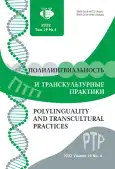Image Analysis as the Means of Cultural Representation Study in a Worldview
- Authors: Balandina E.S.1, Peredrienko T.Y.1
-
Affiliations:
- South Ural State University (National Research University)
- Issue: Vol 19, No 4 (2022)
- Pages: 576-586
- Section: Language in System
- URL: https://journal-vniispk.ru/2618-897X/article/view/326727
- DOI: https://doi.org/10.22363/2618-897X-2022-19-4-576-586
- ID: 326727
Cite item
Full Text
Abstract
The purpose of the article is to present the methodology of image analysis as the means of cultural representation study in a worldview on the example of the image “work”. The research is based on the idea that any phenomena of reality perceived by a person in the process of activity and communication are revealed in his mind through images. These images record not only causal and spatial relationships of phenomena and emotions in the process of perception, but also can be characterized by a certain social and ethno-cultural peculiarities, dynamism and variability. The images connected with real-world objects are studied through the mixed methods research including the associative experiment and gradual scaling. Associative fields constructed in the course of the experiment allow analyzing images from linguistic and psycholinguistic points of view according to the formalgrammatical features of the received responses, contiguity - similarity classification, and semantic field grouping. The experiment was organised between the equal number of Russian, Chinese and Arabic students of 20-25 years old. The interest to study this age group is explained by the fact that it is young people who form the future of any country and society in general. To study the perception of the image “work” the respondents were asked to fulfill the questionnaires in their native languages where they were to write the first association that came to their mind when they saw the word-stimulus. All responses presented in the article were translated into the English language. In conclusion, the authors summarise the received results, describe the complex structure of various associative pairs, and identify differences and similarities in the perception of the studied image in worldviews of various culture representatives.
Keywords
About the authors
Ekaterina S. Balandina
South Ural State University (National Research University)
Author for correspondence.
Email: balandinaes@susu.ru
Associate Professor, Candidate of Philology, Associate Professor of the Department of Foreign Languages of the Institute of Linguistics and International Communications 76, Lenin Ave., Chelyabinsk, 454080, Russian Federation
Tatiana Yu. Peredrienko
South Ural State University (National Research University)
Email: peredrienkoti@susu.ru
Associate Professor, PhD in Philology, Associate Professor of the Department of Foreign Languages of the Institute of Linguistics and International Communications 76, Lenin Ave., Chelyabinsk, 454080, Russian Federation
References
- Zittoun, T., & Gillespie, A. 2015. Internalization: How culture becomes mind. Culture & Psychology, 21(4), P. 477-491. doi.org/10.1177/1354067X15615809
- Johnson, K. 2008. Quantitative methods in linguistics. Wiley-Blackwell Publishing.
- Matsumoto, D. 2006. Culture and Cultural Worldviews: Do Verbal Descriptions about Culture Reflect Anything Other Than Verbal Descriptions of Culture? Culture & Psychology, 12 (1), P. 33-62. doi.org/10.1177/1354067X06061592
- Ufimtseva, N.V. Etnopsikholingvistika: vchera i segodnya [Ethnopsycholinguistics: yesterday and today]. Voprosy psikholingvistiki [Questions of psycholinguistics]. 2006. 4. S. 92-100. (In Russian).
- Dicks, I. D. 2018. Language capacity is not enough: Be intentional about growing culture and worldview understanding. Missiology. An International Review, 46 (3), P. 268-282. doi.org/10.1177/0091829618769903
- Arutyunova N.D. Yazyk i mir cheloveka [Language and the world of a person]. Moscow: Yazyki russkoy kul’tury, 1999. 896 s. (In Russian).
- Smirnov S.D. Obraz mira [Worldview]. Moscow: PER SE, 2005, 153 s. (In Russian).
- Tarasov E.F., & Ufimtseva N.V. Problemy izucheniya yazykovogo soznaniya [Problems of studying linguistic consciousness]. Voprosy psikholingvistiki [Questions of psycholinguistics]. 2009. 10. S. 18-25. (In Russian).
- Kiss, G., Armsthong, C., Milroy, R. 1972. The Associative Thesaurus of English. Edinburgh. doi.org/10.1371/journal.pone.0032809
- Russian Associative Dictionary Russ From the stimulus to the reaction. Open Company “Publishing house Astrel”, Moscow, 2002, 984 s. (In Russian).
- Alekberova I.E. Mezhkul’turnoe vzaimodeystvie kak tsentral’naya dominanta turistskogo biznes [Intercultural interaction as the central dominant of the tourist business]. Yazyk i mezhkul’turnaya kommunikatsiya [Proceedings of the Language and Intercultural Communication]. 2011. S. 122-125. (In Russian).
- Featherstone, M. 2011. Societal value formation and the value of life. Current Sociology, 59 (2), P. 119-134. doi.org/10.1177/0011392110391129
- Dun-Runkin, P., Gerald, A. 2012. Scaling methods. New York: Psychology press.
- Ushakova, T.N. Lingvisticheskoe soznanie i printsipy ego issledovaniya [Linguistic consciousness and the principles of its research]. Yazykovoe soznanie i obraz mira [Proceedings of Linguistic consciousness and the worldview]. 2000. S. 13-23. (In Russian).
- Frumkina R.M. Psikholingvistika [Psycholinguistics]. Moscow: Academy, 2001. 320 s. (In Russian).
- Zalevskaya, A.A. Psikholingvisticheskie issledovaniya. Slovo. Tekst [Psycholinguistic research. Word. Text]. Gnosis, Moscow, 2005, 543 s. (In Russian).
- Sorokin Yu.A. Etnicheskaya konfliktologiya (teoreticheskie i eksperimental’nye fragmenty) [Ethnic conflictology (theoretical and experimental fragments]. Institute for Problems of Risk, Moscow, 2007, 120 s. (In Russian).
- Roberts, L. 2012. Psycholinguistic techniques and resources in second language acquisition research. Second Language Research, 28 (1), P. 113-127. doi.org/10.1177/0267658311418416
- Beskorovainaya I.G. Assotsiativnyy eksperiment kak sposob rekonstruktsii fragmentov yazykovogo soznaniya [Associative experiment as a way of reconstructing fragments of linguistic consciousness]. Voprosy psikholingvistiki [Questions of psycholinguistics]. 2004. 2. 73-77. (In Russian).
- Аrsenyeva, I.A., Аntonova, N.A., Ivanova, A.S., Yakushev, V.V., Timashova, L.V. 2018. Visualization of the emotional vocabulary of the Chinese language as exemplified in the associative experiment. XLinguae, 11 (1), P. 251-268. doi: 10.18355/XL.2018.11.01.21
Supplementary files









